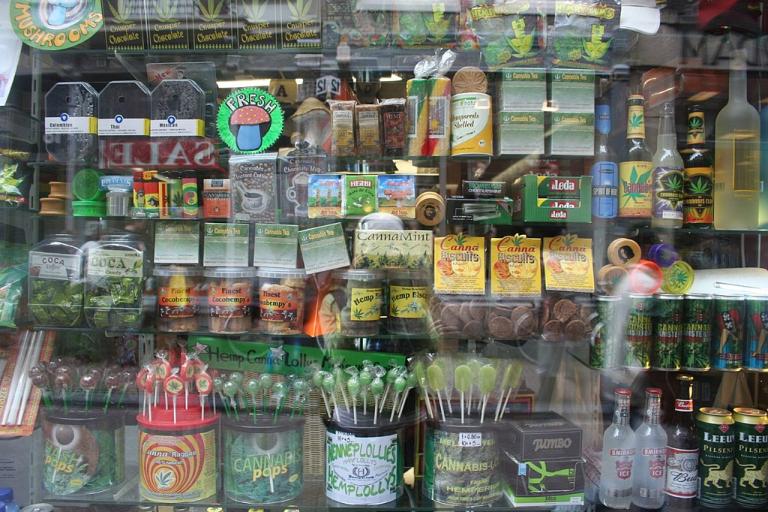Recreational marijuana is legal in 19 states. Twenty more states have legalized medical marijuana. Here in Oklahoma, we have a hybrid: medical marijuana for any reason claimed by the user. Call it recreational with a license.
But aging Baby Boomers with fond memories of the Sixties and even 30-somethings remembering the buzz they got in college from illegal weed probably don’t realize what is being sold in the cannabis dispensaries filling the strip malls and what that product is doing to many of its users.
That is the message of an important article in The Tablet, a Jewish news site–not a culturally conservative magazine–by Leighton Woodhouse entitled How Weed Became the New OxyContin. The deck (the description following the headline) sums it up: “Big Pharma and Big Tobacco are helping market high-potency, psychosis-inducing THC products as your mother’s ‘medical marijuana.’”
The substance in marijuana that creates the “high” it bestows is THC. According to the article, the weed the hippies smoked was just 2% THC. Since then, illegal growers, entrepreneurs that they are, bred the plant so that it reached a level of 20% THC. That’s 10 times more potent than it was in the 1960s.
But the now-legal dealers have gone much, much further. They are extracting the THC from the plants and concentrating it, manufacturing a wax that has a THC level of 80%. This, in turn, can be further concentrated into an oil with a THC level of 95%. This is turned into doses known as “dabs,” which are smoked with vape pens. It’s also used to make edibles and drinkables. Comments Woodhouse,
If you’re over 30 years old and you used to smoke weed when you were a teenager, the strongest you were smoking was probably 20% THC. Today, teenagers are “dabbing” a product that’s three, four, or five times stronger, and are often doing so multiple times a day. At that level of potency, the impact of the drug on a user’s brain belongs to an entirely different category of risk than smoking a joint or taking a bong rip of even an intensively bred marijuana flower. It’s highly addictive, and over time, there’s a significant chance it can drive you insane.
Woodhouse cites a number of terrifying cases of users completely losing their minds, descending into weird delusions, paranoia, schizophrenia, violence, and suicide. And he quotes a number of medical experts who treat addiction, such as this: “I started seeing people with the worst psychosis symptoms that I have ever seen,” [said Dr. Libby Stuyt,, who worked with meth and heroin addicts] “And the worst delusions I have ever seen.”
And psychosis from cannabis use is a common effect. Woodhouse cites the common experience among old-school smokers of of feeling “paranoid,” of becoming “irrationally anxious that everyone is staring at you and knows you’re high.” That is a mild form of cannabis psychosis, Woodhouse says, experienced by 40% of users. That becomes intensified for users of the high-potency THC products, leading 35% of those so affected to an actual “psychotic episode.”
If you keep using after that, you run a decent risk of ending up permanently schizophrenic or bipolar. Cannabis has by far the highest conversion rate to schizophrenia of any substance—higher than meth, higher than opioids, higher than LSD. Two Danish studies, as well as a massive study from Finland, put your chances at close to 50%.
“One out of every 20 daily users can expect to develop schizophrenia if they don’t quit,” Dr. Christine Miller, an expert on psychotic disorders, told me.
But quitting THC products of that potency is “almost impossible,” Stuyt said, comparing its addictive power to tobacco. The days of marijuana addiction being merely “psychological” are over. “There is a definite withdrawal syndrome that includes irritability, anger, anxiety, massive cravings, can’t sleep, can’t eat,” said Stuyt.
But what about medical marijuana? Isn’t it a good treatment for all kinds of conditions?
Well, maybe it could be. But unlike other medicinal drugs, there is little medical research to learn about that. The little research that has been done uses doses of just 10% THC. The lack of scientific trials and FDA study is largely because of the federal law that still outlaws the drug. Yet the “medical” use goes forward, with online “doctors” who never see their patients signing marijuana card applications for a fee and with no limits on dosage.
Woodhouse quotes the father whose son committed suicide because of cannabis-caused delusions: “What medicine do you get from a doctor that’s 100% always approved, that you can get within 10 to 15 minutes online, you can take as much as you want per year, you never have to come back to renew it?” And an addiction recovery specialists adds, “This doctor’s recommendation typically has no expiration, has no dose, has no duration, and no change across state lines,” Ben Cort said. “It’s basically, ‘Take as much as you want as often as you want until you feel what you want.’”
Woodhouse also points out that the major investors in Big Cannabis are Big Tobacco, Big Alcohol, and Big Pharma.
As states rush to legalize cannabis–to the point that some states are enshrining the right to marijuana in their constitutions–they would do well to realize what they are doing and what they are getting.
Photo: Cannabis products by nickolette from Bulgaria, CC BY 2.0 <https://creativecommons.org/licenses/by/2.0>, via Wikimedia Commons












